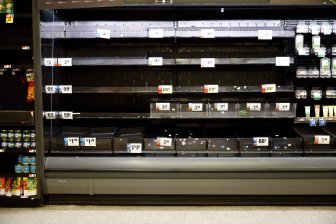Russia sending more troops to Belarus amid rising tensions with Ukraine – National
Russia is a sending an unspecified number of troops from the country’s far east to Belarus for major war games, officials said Tuesday, a deployment that will further beef up Russian military assets near Ukraine amid Western fears of a planned invasion.
Amid the soaring tensions, the White House warned that Russia could attack its neighbor at “any point,” while the U.K. delivered a batch of anti-tank weapons to Ukraine.
Read more:
Canada ‘looking at options’ over Ukraine’s requests for weapons, equipment
Russia’s Deputy Defense Minister Alexander Fomin said the joint drills with Belarus would involve practicing a joint response to external threats.
Ukrainian officials have warned that Russia could launch an attack on Ukraine from various directions, including from its ally Belarus.
Story continues below advertisement
The U.S. again stressed its concern Tuesday, with White House press secretary Jen Psaki describing the Russian forces’ move into Belarus as part of as “extremely dangerous situation.”
“We’re now at a stage where Russia could at any point launch an attack in Ukraine,” she said.

Exclusive: Canada deploying special forces to Ukraine as tensions with Russia escalate
A series of talks last week between Russia, the U.S. and NATO failed to quell the tensions over Ukraine. U.S. Secretary of State Antony Blinken will meet his Russian counterpart Sergey Lavrov in Geneva on Friday in another attempt to defuse the crisis.
Ukraine’s Defense Ministry said Tuesday it has received a shipment of anti-tank weapons from the U.K., noting that they will help “strengthen our defense capability.” The statement didn’t say how many weapons were delivered.
Russia already has started moving troops for the war games in Belarus. Fomin said it would take through Feb. 9 to fully deploy weapons and personnel for the Allied Resolve 2022 drills, which are expected to take place Feb. 10-20.
Story continues below advertisement
Read more:
Russia denies U.S. allegations it’s preparing pretext to invade Ukraine
Fomin didn’t say how many troops will be involved in the drills, but mentioned that Russia will deploy a dozen Su-35 fighter jets and several air defense units to Belarus. The deployment would bolster an estimated 100,000 Russian troops with tanks and other heavy weapons who are already amassed near Ukraine in what the West fears could be a prelude to an invasion.
Russia has denied an intention to attack its neighbor but demanded guarantees from the West that NATO will not expand to Ukraine or other ex-Soviet nations or place its troops and weapons there.
Washington and its allies firmly rejected Moscow’s demands during Russia-U.S. negotiations in Geneva and a related NATO-Russia meeting in Brussels last week.
Fomin said the drills in Belarus, which involve an unspecified number of troops from Russia’s Eastern Military District, reflect the need to practice concentrating the country’s entire military potential in the west.
Trending Stories
-

Grocery stores could close if labour, product shortages worsen: experts -

B.C. to allow gyms to reopen Jan. 20, but extends other restrictions
“A situation may arise when forces and means of the regional group of forces will be insufficient to ensure reliable security of the union state, and we must be ready to strengthen it,” Fomin said at a meeting with foreign military attaches. “We have reached an understanding with Belarus that it’s necessary to engage the entire military potential for joint defense.”
Story continues below advertisement

White House says ‘consequences will be severe’ for Russia if they don’t take diplomatic path on Ukraine
Belarus’ authoritarian president, Alexander Lukashenko, said the joint maneuvers will be conducted on Belarus’ western border and also in the country’s south, where it borders Ukraine.
Amid the tensions, Ukraine’s Defense Ministry said Tuesday it was speeding up efforts to form reserve battalions that would allow for the rapid deployment of 130,000 recruits to expand the country’s 246,000-strong military. The battalions from the newly formed Territorial Defense Forces could include reservists from aged 18 to 60.
The United States and its allies have urged Russia to deescalate the situation by calling back the troops amassed near Ukraine.
“In recent weeks, more than 100,000 Russian troops with tanks and guns have gathered near Ukraine without an understandable reason, and it’s hard not to understand that as a threat,” German Foreign Minister Annalena Baerbock told reporters Tuesday after talks in Moscow with her Russian counterpart, Lavrov.
Story continues below advertisement
Read more:
Canada deploys special forces to Ukraine amid rising tensions with Russia
Lavrov responded by restating Moscow’s argument that it’s free to deploy its forces wherever it considers it necessary on its territory.
“We can’t accept demands about our armed forces on our own territory,” Lavrov said, adding that “troops’ training is something that every country does.”
“We aren’t threatening anyone, but we are hearing threats to us,” he added. “We will decide how to react depending on what specific steps our partners will take.”
Baerbock emphasized that the West was ready “for a serious dialogue on mutual agreements and steps to bring everyone in Europe more security.”
NATO Secretary-General Jens Stoltenberg met with German Chancellor Olaf Scholz in Berlin on Tuesday. He said “the main task now is to make progress on the political way forward” to prevent a military attack against Ukraine.

Massive cyber attack warns Ukraine to ‘expect the worst’ amid tensions with Russia
“NATO allies are ready to meet with Russia again, and today I have invited Russia and all the NATO allies to attend a series of meetings in the NATO-Russia Council in the near future to address our concerns but also listen to Russia’s concerns,” Stoltenberg said.
Story continues below advertisement
He added that NATO “in the near future” will deliver its written proposals in response to Russian demands and “hopefully we can begin meeting after that.”
“We need to see what Russia says, and that will be a kind of pivotal moment,” the NATO chief said.
Lavrov, meanwhile, reaffirmed that Russia wants a quick Western answer to its demand for security guarantees that would preclude NATO’s expansion to Ukraine and limit its presence in Eastern Europe. He repeated that in a phone conversation with Blinken, who will visit Ukraine on Wednesday and meet with Lavrov on Friday.
Lavrov also urged Blinken “not to spread speculation about the alleged `Russian aggression’ being prepared,” the Russian Foreign Ministry said
Speaking on a visit Tuesday to Ukraine, Canadian Foreign Minister Melanie Joly denounced the Russian troop buildup as unacceptable. She noted Canada’s efforts to help train Ukraine’s military, adding that it’s currently considering Ukraine’s demand to provide it with military equipment and will make “a decision in a timely manner.”
Russia annexed the Crimean Peninsula from Ukraine in 2014 after the ouster of Ukraine’s Moscow-friendly leader and also threw its weight behind a separatist insurgency that took over large sections in eastern Ukraine. More than 14,000 people have been killed in nearly eight years of fighting there.
Aamer Madhani in Washington, Geir Moulson in Berlin, Lorne Cook in Brussels, and Yuras Karmanau in Kyiv, Ukraine, contributed to this report.
© 2022 The Canadian Press
Source link : CNN
Leave a Reply Cancel reply
RECOMMENDED NEWS
BROWSE BY CATEGORIES
BROWSE BY TOPICS
POPULAR NEWS
2021 © All rights Reserved ChrisAnu











